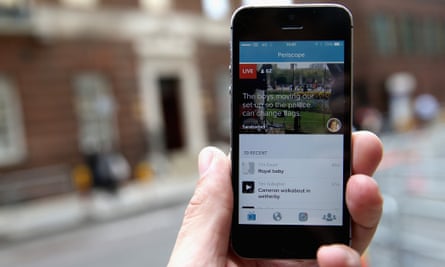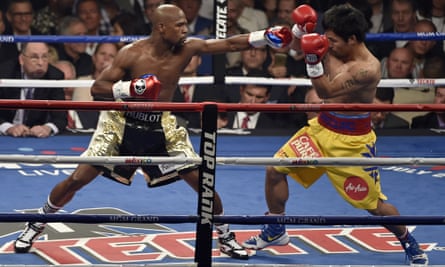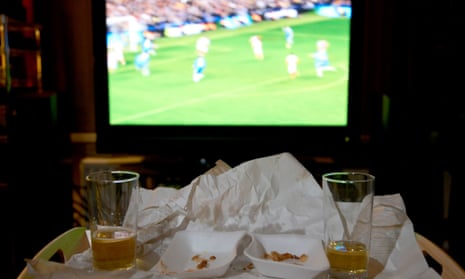Anyone with a smartphone, the internet and an app can now broadcast live video to the world. But, while great for users is it a nightmare for content rights holders?
Live video streaming is nothing new – services have been around since the early 2000s – but Meerkat and Periscope have made it easier to broadcast our lives on the go and shifted the appeal near to the mainstream. Ever since they launched, however, speculation has followed over the potential legal liability for content delivered on their platforms.
These live streaming apps let users simply point their smartphones at whatever is happening in front of them, whether they own the rights or not, and broadcast it to a potential audience of hundreds of thousands now, millions in the future.

Concern has been raised, in particular, over large right holders such as sports broadcasters and Hollywood studios suing Periscope for users who film content direct from TV or events via their smartphone.
Periscope was bought by Twitter in January this year for an undisclosed sum thought to be slightly less than $100m. Given Twitter has a market cap of over $24bn, and most of Periscope’s competitors are not much more than startups, it is Periscope that makes the most potentially lucrative target.
How live is ‘live’?
The key difference between services such as Google’s YouTube and the newer live-streaming apps is the live element. YouTube, for instance, automatically scans for copyrighted content in new uploads using Google’s “Content ID” system, while providing notification and takedown schemes under the US Digital Millennium Copyright Act (DMCA).
Twitter has had practice with similar issues with Vine. The looping video service drew the attention of the Premier League in the UK, which worked with the social network to develop an effective notification of infringement and takedown system. That same system could insulate Periscope.
“Twitter, Meerkat or any other company hosting live streams from users [are] not in breach of copyright in the UK or US just because a user starts streaming copyrighted content such as a football match [by] pointing their phone at a TV broadcast,” explained Julian Moore, a head of broadcast and media rights with Pinsent Masons global sport practice. “They are only in breach if they effectively turn a blind eye to the stream, if they are made aware of it and don’t take measures to remove it.”
Periscope’s terms of service specifically prohibit the broadcasting of copyrighted content without permission.
A Periscope spokesperson told the Guardian: “Periscope operates in compliance with the DMCA, we respect intellectual property rights and are working to ensure there are robust tools in place to respond expeditiously.”
Due to its live nature, it is unlikely to attract the ire of Hollywood – more concerned will be broadcasters of live events such as sports where their value is inherent to their timeliness.
TV companies the world over pay exorbitant amounts for the rights to broadcast sporting events. Any attempt to circumvent of those rights is seen in a very dim light.
The National Hockey League, which governs ice hockey in the US, has already specifically banned both Meerkat and Periscope including any live streaming up to 30 minutes before face off. The US Open golf tournament has taken similar steps.
The MLB, however, has said it won’t stop fans using Periscope and Meerkat at games.
Meanwhile the NBA and NFL have policies that restrict both reporters and fans live broadcasting footage of the game, the players or backstage action stamped on the back of press passes and tickets. Given broadcasters pay $4.95bn a year for the rights to the NFL alone there is certainly an emphasis from the sports leagues to protect that lucrative revenue stream.
One place leagues and sports can’t stop users directly is in the home.

After seeing Periscope users broadcast the Game of Thrones season five premiere from their screens, HBO then saw an estimated 10,000 people watching the Mayweather-Pacquiao fight via Periscope without paying.
People who had paid their $100 for the pay-per-view event were streaming it straight from their TVs for others to watch. And while Twitter took down streams within minutes of being notified – it received 66 takedown requests and removed 30 streams, the company said – others cropped up in their stead.
“Piracy does not excite us. Trust me, we respect intellectual property rights and had many people working hard to be responsive last night, including myself,” Periscope’s chief executive Kayvon Beykpour said after the fight.
Sports leagues across America are watching the evolution of Periscope and its ilk closely, but seemingly no one wants to be the first to either ink deals with the new service or take action.
“Besides protecting the broadcasting rights, most sports leagues want to make sure a service like Periscope isn’t building up its business on the back of their content,” said a national American sports league executive with direct knowledge of the matter. “Once they become established, who knows, maybe we’ll do a deal with them. Everybody’s waiting to see how everybody else reacts.”
In the UK, any big rights battle is expected to be over Premier League football. Sky and BT paid £3bn between 2013 and 2016 for the rights to live games and have forked out a further £5.1bn for live games between 2016 and 2017. News International also owns the rights for clips of key moments worth £20m for three years, while the BBC owns the rights to highlights costing £180m until 2016 and a further £204m until 2019.
However, the Premier League is purposefully quiet on copyright infringement, taking the view that they don’t want to treat fans like pirate enemies (something they have been accused of in the past), and have been working with third-parties including Net Result, Irdeto and ID Inquiries to shut down persistent and commercial copyright offenders.
“The Premier League already works with Twitter over Vines, which are frequently used by users to show goals and key moments from games without permission. We work closely with Twitter and ISPs to take down pirated content as well as advising users that it is illegal to post such content,” said a Premier League spokesman. “Last season we successfully blocked 45,000 streams that were illegally showing Premier League footage, and successfully took legal action against certain websites, both in the English and overseas courts.”
For now Periscope – and Meerkat – is in the clear. Whether that changes when the next NFL and Premier League seasons kick off remains to be seen.

Comments (…)
Sign in or create your Guardian account to join the discussion